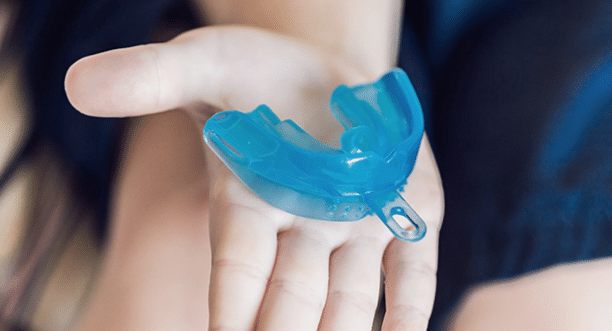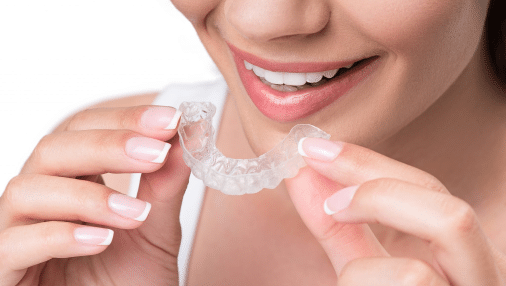

If you are grinding your teeth at night – yes, you do. At PeakView Cosmetic & Implant Dentistry, we believe in the value of preventative care, and night guards are one of the ways we can prevent you from damaging your teeth. Since you only get one set of permanent teeth, allowing them to be ground down is unwise. The discomfort you will suffer and the cost you will incur to repair your teeth is simply not worth skipping out on this easy, preventative measure. We know that not all of our patients enjoy the idea of wearing a guard, and we will not recommend doing so unless we are certain that it will be useful in solving your problems.
If you have paid to repair your teeth or have had cosmetic work done to improve your appearance, teeth grinding could reverse all that the work. Even if your teeth have never needed repair, grinding can cause your teeth to chip, crack, or simply wear down. This translates into direct discomfort as the teeth flatten, and your dentin or nerves could become exposed. This can lead to feelings of sensitivity when you eat or drink. If this type of damage continues, you could end up with gum recession and even loose teeth. If you use a night guard, your upper and lower teeth will be unable to grind against each other and the potential damage will be avoided.
Nighttime teeth grinding can cause severe headaches and tooth pain in the morning. If you are regularly waking up in pain or feeling uncomfortable, this can be a sign that you need to wear a guard while sleeping. At PeakView Cosmetic & Implant Dentistry, we have found that many of our patients feel significantly better after wearing their guard for just a few days. The key is to continue wearing it every night. While some grinding is caused by stress or tension, there is no way to tell exactly what causes people to grind their teeth or to stop the body from attempting it. This is why continued use of the guard is necessary.
Severe grinding or jaw clenching can lead to TMJ disorder. This can be incredibly uncomfortable, typically starting out as a sore jaw in the morning with the occasional headache. If you experience these symptoms or have face pain, neck pain, or your jaw hurts while eating, book an appointment right away. It is critical that you treat TMJ early by wearing a night guard and preventing your teeth from clenching or grinding in your sleep. Otherwise, TMJ can become severe. At this stage, some people find it difficult to even open their mouth, let alone eat or speak normally.
A dental night guard is a custom-made oral appliance that is worn during sleep. It is designed to protect the teeth from grinding or clenching, alleviate jaw pain, and help with snoring or sleep apnea.
You may need a dental night guard if you have bruxism (teeth grinding), temporomandibular joint (TMJ) disorders, or if you snore or have mild to moderate sleep apnea. It helps protect teeth, reduce jaw pain, and improve airflow during sleep.
A dental professional takes impressions or digital scans of your teeth and sends them to a dental laboratory. The night guard is then custom-made based on these impressions to ensure a precise fit.
Yes, a properly fitted dental night guard should be comfortable to wear. It is made to fit your teeth and gums, providing a cushioning effect and minimizing discomfort.
The duration of wearing a night guard depends on the underlying condition. Some individuals may need to wear it long-term, while others may require it for a shorter period. Your dentist will determine the appropriate duration based on your specific needs.
Night guards are primarily designed for nighttime use, but there are certain instances where they can be worn during the day, such as if you clench or grind your teeth during waking hours. However, it is important to consult with your dentist to determine the best course of action.
Night guards should be cleaned daily using a mild soap and water or a non-alcoholic mouthwash. Avoid using hot water or abrasive cleaners that can damage the appliance. Additionally, store it in a clean, dry case when not in use.
The lifespan of a night guard varies depending on factors such as the material used and the level of wear. On average, they can last between 2 to 5 years, but it is important to have regular check-ups with your dentist to evaluate the condition of the night guard and determine if a replacement is necessary.
Discover the passion and commitment that drives our dental team

Dr. Adam Kwiatkowski, a graduate of the University of Illinois at Chicago College of Dentistry, has received multiple awards for his outstanding achievements in cosmetic and implant dentistry. He is a recipient of the International Congress of Oral Implantologists’ Pre-doctoral Student Achievement Award and a member of the Omicron Kappa Upsilon National Dental Honor Society.

Dr. Hearne, originally from Las Vegas, was inspired to become a dentist at the age of 12 by a close family friend who was a renowned dentist. With a foundation in customer service and excellence from his early career in the hotel industry, Dr. Hearne was further inspired to become a compassionate caregiver for his patients after the passing of his younger brother to cystic fibrosis at the age of 7.

I was born in Ogden, Utah and always knew I wanted to pursue a career in healthcare. After serving an LDS mission in South Africa and getting married, I studied biology at Weber State University and attended the prestigious Creighton University School of Dentistry in Omaha, Nebraska. There, I received multiple awards for clinical excellence before settling down in St. George with my family.

Tuesdays by appointment only